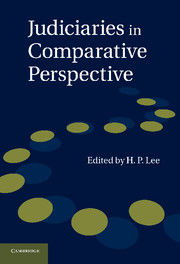Book contents
- Frontmatter
- Contents
- Contributors
- Foreword
- Preface
- Table of cases
- Table of statutes
- Part I
- Part II
- 2 Appointment, discipline and removal of judges in Australia
- 3 Appointment, discipline and removal of judges in Canada
- 4 Appointment, discipline and removal of judges in New Zealand
- 5 Appointment, discipline and removal of judges in South Africa
- 6 Appointment, discipline and removal of judges
- 7 Judicial selection, removal and discipline in the United States
- Part III
- Part IV
- Part V
- Part VI
- Index
- References
4 - Appointment, discipline and removal of judges in New Zealand
from Part II
Published online by Cambridge University Press: 07 September 2011
- Frontmatter
- Contents
- Contributors
- Foreword
- Preface
- Table of cases
- Table of statutes
- Part I
- Part II
- 2 Appointment, discipline and removal of judges in Australia
- 3 Appointment, discipline and removal of judges in Canada
- 4 Appointment, discipline and removal of judges in New Zealand
- 5 Appointment, discipline and removal of judges in South Africa
- 6 Appointment, discipline and removal of judges
- 7 Judicial selection, removal and discipline in the United States
- Part III
- Part IV
- Part V
- Part VI
- Index
- References
Summary
This chapter examines the appointment, discipline and removal of judges in New Zealand. Developments over recent years have formalised the procedures for appointing and disciplining judges, including the procedures that might lead to a judge’s removal. Previously, appointments to judicial office were shrouded in secrecy and mystery, and the disciplining of judges was meted out in camera away from the public eye. That system came under mounting scrutiny and pressure for change, with calls for greater transparency and accountability within the judiciary. Changes introduced from 1999 standardised the appointing procedures and made them more transparent, and established a formal complaints process for investigating complaints of judicial misconduct. These changes codified the procedures, but they still remain more permissive than in most other jurisdictions. Heads of bench lack any direct disciplinary powers over their colleagues and appointments to judicial office remain largely at the discretion of those administering the appointments process. New Zealand has resisted setting up a judicial appointments commission which most other jurisdictions have established.
This chapter falls roughly into two parts. The first part sources the guarantee of judicial independence in New Zealand and examines the procedures for appointing, disciplining and removing judges. The second part contextualises the discussion within New Zealand by identifying several practices that, in the writer’s view, compromise the principle of judicial independence.
- Type
- Chapter
- Information
- Judiciaries in Comparative Perspective , pp. 66 - 95Publisher: Cambridge University PressPrint publication year: 2011



